Blank Leadership Scholars Profiles
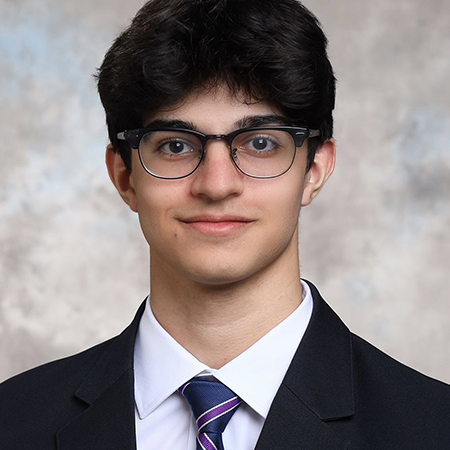
Aarav Dogra ’28
An entrepreneur since he was a preteen, Aarav Dogra ’28 has a passion for combining innovation with social good.
For over half a decade, entrepreneurship has been a cornerstone of Aarav Dogra’s life. It started when he was 12, when he discovered he could utilize social media marketing and branding to make a commission on his graphic design creations.
From there, innovation continued to captivate him. “Over time, I cultivated quite an entrepreneurial spirit, an ability to recognize problems and instantaneously ideate lucrative solutions,” Dogra says.
As he progressed in school, he learned about investing, affiliate marketing, app building, e-commerce, and the resell market. He also discovered the community-minded aspects of entrepreneurship.
“Entrepreneurship can be used for more than just generating personal profits,” Dogra says. “It can be a powerful tool to make a meaningful difference in the lives of others.”
In high school, he started a personal investing club, where he established a philanthropic investment fund. He and his fellow students turned $5,000 of their own money into over $20,000. They then donated half of the investments to various student-led initiatives that tackle a range of social issues. Now, he’s at Babson, ready to find his next project.
What drew you to Babson?
What drew me to Babson is its strong focus on entrepreneurship. Starting my journey as an entrepreneur at 12 has been a significant part of my life, and I’m eager to maintain and nurture this spirit. Babson’s supportive community seems like the perfect place to continue growing, learning, and connecting with others who share similar passions.
What are your career goals?
I enjoy working for myself, and I want to turn my passion for innovating and problem solving into a career. My experiences have taught me that with hard work, anything is possible, no matter the challenges. While I’m aware of the inherent risks and uncertainties of entrepreneurship, I’m confident in my ability to scale my ventures to new heights.
How do you view challenges?
Encountering challenges is an indication that I’m on the right path. Challenges occur when you’re doing something unfamiliar. Overcoming them means pushing boundaries and stepping out of your comfort zone, both of which are essential for self-improvement.
What is the proudest moment of your life so far?
The proudest moment of my life was seeing my entrepreneurial efforts make a real, meaningful impact on those in my community. As part of the personal investment club I created at my high school, we had a live investment account that generated funds for altruistic causes. Our most notable initiative was showing appreciation to our school’s caretakers by giving all 45 custodians a gift card with a personalized thank-you note. We were able to show gratitude to those who often go unnoticed, those who tirelessly work to maintain our community’s cleanliness and are often treated with disregard. Seeing their surprised and appreciative reactions was incredibly heartwarming and reinforced my belief in the power of giving back.
Entrepreneurship can be used for more than just generating personal profits; it can be a powerful tool to make a meaningful difference in the lives of others.
If you could tackle one global problem, what would it be?
Wealth inequality. Life is inherently unpredictable and uncontrollable—we are all born into different financial situations, facing diverse concerns and varying qualities of life. This randomness means millions are born into conditions of extreme poverty, leaving them with limited access to basic needs such as food, clean water, healthcare, and education. I believe everyone deserves a fair chance at a livable quality of life regardless of birth circumstances. By redistributing wealth in a way that ensures broader access to essential resources and opportunities, we can create a more equitable society where life’s inherent randomness doesn’t result in such severe outcomes.
What does being a Blank Scholar mean to you?
This opportunity means joining a community of passionate leaders and entrepreneurs who are committed to making a difference. It’s truly an honor to be selected as a Blank Scholar, and I’m eager to collaborate with like-minded individuals to create meaningful impact.
Of Blank’s six leadership qualities, which one do you most identify with and why?
I identify most with the value of Innovate Continuously. Running businesses across various markets has taught me that maintaining a competitive edge is crucial for profitability. This often requires developing new strategies or technology. For example, in the highly competitive algorithmic trading market, where trades are executed automatically by computer programs, I must constantly optimize my algorithms to enhance speed and efficiency. Without ongoing innovation, I would quickly lose my edge and fall behind the competition, especially against large institutions.
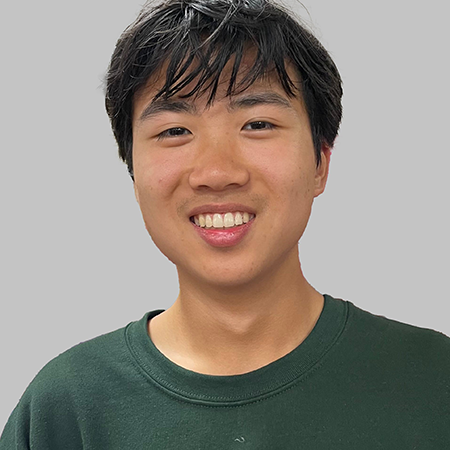
Jerry Du ’28
Known for wearing many hats in high school, Jerry Du ’28 is ready to tap into his entrepreneurial side.
During high school, Jerry Du was a bit of a chameleon. You could probably find him practicing with the band and local orchestras, as he played clarinet for eight years. His role in the band means he can say he performed at the National Gallery of Art and the Kennedy Center in Washington, D.C., and even at various cathedrals in Europe.
Or maybe you found him practicing with the indoor and outdoor track teams. Or tutoring clarinet locally or teaching English to grade-schoolers in China. Or maybe as a web development intern for the nonprofit Seaside Sustainability. But, if you ask Du what he was most proud of during his high school years, it’s probably his T-shirt company.
“It’s called Du the Right Thing, it’s a pun on my last name,” Du says. “Over the past few years, I’ve mainly been making custom shirts for my friends and classmates, but I’m hoping that once I get to Babson, I’ll pivot toward larger collections.”
Du speaks fondly of designing shirts for his classmates, including for his multivariable calculus class to commemorate the end of the school year. He had a week to get the order done, which included surveying students on designs, printing shirts, and enlisting help. Seeing the gratitude made it worth it.
“I just remember walking around with my friend and joking with my classmates, hearing them say the shirts were cool and thanking me for getting it done in time,” he says.
What drew you to Babson?
At first, I didn’t know if Babson’s business-oriented curriculum would be the right fit for me. I knew I wanted to do business, but I didn’t know if I wanted to solely do business. But then one day, Victor Fan (an assistant director of undergraduate admission at Babson) happened to stop by my school, and I wanted to know more.
From that conversation, I saw how much Babson values its community and especially its students. It struck a chord with me.
What are your career goals?
All throughout high school, I didn’t really know what I wanted to do until the last year. But, what really made me think about business was the fact that I like to design a lot. I like to create things, whether it’s as a web developer, making clothes, or 3-D printing. I want to flex my own creativity, and I think business allows me to do that in unconventional ways. That’s something I admire about Babson’s curriculum.
What do you hope to accomplish at Babson?
I want to meet a lot of new people. I know the professors and students at Babson are all amazing, and I’m excited to talk with them and see what their goals are. Maybe our goals align, and maybe we can work together.
How do you view challenges?
They’re like quests in a video game. I either don’t have the knowledge or I don’t have the skills. But, that just means that if I were able to tackle these challenges, then I would gain those things. I think life would be a lot harder if I didn’t tackle any of these challenges and become the person I am today.
If you could tackle one global problem, what would it be?
We’ve seen in the past few years how COVID-19 has really affected the supply chain. Even though we have the internet where we can just instantly connect with anybody across the world, if we wanted to get things around, we still rely on cars, trains, planes, and ships.
We should focus on ensuring transportation is efficient, safe, reliable, and sustainable for the future.
Can you kind of talk about a time someone in your life was a good leader?
When I was interning for Seaside Sustainability, one of the things I really struggled with was the fact that we all work remotely from different time zones. My supervisor helped the team come together and make sure all our projects were done on time. He taught me that success is not just about your skills as a person; it also depends on how well you coordinate and communicate with others.
What does being a Blank Scholar mean to you?
It means being a part of a tight-knit group of ambitious and accomplished individuals. And, it’s a privilege to be around these amazing people. I’m grateful to the Blank School for creating this program and helping students succeed. I think I’m also very excited to see what we can accomplish together as a group and especially in the future.
Of Blank’s six leadership qualities, which one do you most identify with and why?
Put People First because I feel like that’s the entire point of business. That’s why I do business and what I think the best businesses do. One of my biggest fears is designing new clothes and nobody wears them. I can’t imagine selling someone a shirt I’ve worked on for days or weeks, and they just throw it in the back of the closet.
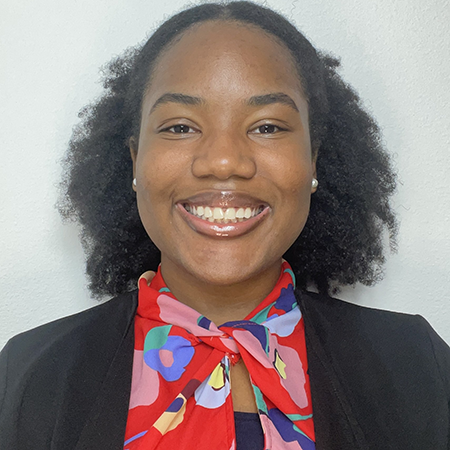
Kimberly Joachim ’28
Kimberly Joachim ’28 hopes to use her degree to open doors for others.
When Kimberly Joachim thinks about her career, she thinks about creating opportunities. It partially stems from her upbringing as the daughter of Haitian immigrants in Florida. With a passion for fashion and community service, she hopes to use her degree to provide a spotlight for others.
“I want to have a national chain of outlets that feature businesses with owners of people of color. I feel like it’s hard for us to get representation and get the proper resources,” Joachim says.
She also sees another gap in the market: the dwindling options for third spaces in our digital world, especially for young people.
“I'm big on the arts, so maybe I can create a cultural hub. There are just some places I used to go to in my childhood that when I go to now, they look like a ghost town,” she says. “After seeing teenagers and Gen Z share their experiences on loneliness, it’s time we think about how we can connect with people in person.”
Right now, Joachim’s third place is the Babson campus, where she’s excited to explore resources from the Weissman Foundry and other iconic Babson spots.
What drew you to Babson?
I wanted to go to fashion school, but I also really love helping people. I didn’t want that to start after my degree. I wanted an institution that would give me the resources to do that and the knowledge. Babson was the only school that understood that.
What do you hope to accomplish at Babson?
I want to take advantage of the resources so I can get more into my creativity and find some like-minded people like me so we can work on some projects. I am excited about the resources at the Weissman Foundry. I want to explore my creative identity.
How do you view challenges?
I think the hardest part of a challenge is overcoming the mental block. You have some intimidation toward it, but I understand that this is an opportunity for me to grow and I can’t be the person I need to be if I’m scared to come out of my comfort zone.
You’re just understanding that even if I don’t have the skills now, I will learn them.
What is the proudest moment of your life so far?
Getting my IB diploma meant a lot to me. My senior year was tumultuous, as we moved during it. I also didn’t get diagnosed with autism until I was 18. During my senior year, I started to realize there’s probably a gap in how I approach my education. But, I realized it was too late to get the support I needed.
I did not have the proper accommodations, and the whole year I overcompensated for that. I ended up going through autistic burnout. My diploma showed me all my hard work really paid off.
In terms of activities I was a part of, when I was in choir in my senior year, we got the chance to perform at Carnegie Hall. I attended a predominantly Black school, and I think we were the only predominantly Black choir there. That’s something I am proud of.
If you could tackle one global problem, what would it be?
Because of my experience with mental health, I just wish I could change the stigma on people that exist differently, whether that’s because of an impairment, a mental health disorder, or just their gender or sexual expression.
I think everyone should learn how other people interact with the world. Me being on the spectrum, sometimes I find that I’m trying to accommodate other people from my existence, rather than just presenting myself as I exist naturally. I know I’m not alone in this.
Who inspires you?
In terms of who inspires me, it would be my mom. I’m a first-generation American, and my family immigrated to the States from Haiti, and just hearing her story and hearing how rough being here initially was for them, and still my mom telling me when God blesses you, bless others, it shows her compassion. I hope I can be as compassionate as her.
How will you bring part of home with you to Babson?
I hope I don’t lose my native language. We speak Haitian creole; I understand it, but I can’t really speak it. While I’m at college, I hope to keep developing my specific language. I think language is so important, and I want to preserve that so I’m not losing that piece of my culture.
What does being a Blank Scholar mean to you?
It means that my eagerness to change the world is visible and that just gives me the confidence to act boldly as I start my journey of just trying to create a legacy of being a social innovator.
Of Blank’s six leadership qualities, which one do you most identify with and why?
Mostly because of my mom, it’s Give Back to Others. I know wherever I am, I will always have something that somebody else could probably benefit from because they don’t have it or they just might need it more. I’m so grateful to be in the position that I’m in because I feel like so many resources have been poured into me, and I'd like to do the same for others.
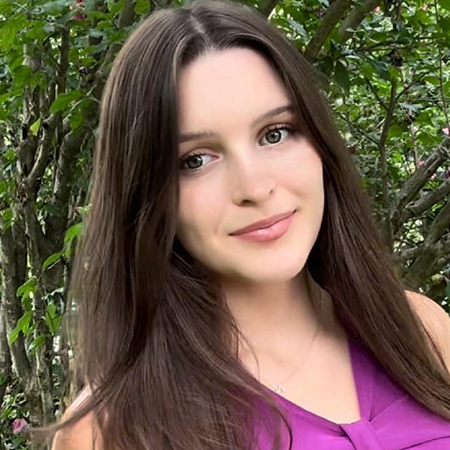
Mya Kelleher ’28
Mya Kelleher ’28 hopes to propel her love of learning foreign languages into her entrepreneurial career.
Mya Kelleher enjoys studying languages and is mostly self-taught. If you ask her the best way to learn a new language, she will suggest just jumping right into it.
“I think the best way to learn is through a language-learning technique called comprehensible input,” Kelleher says. “It’s when you immerse yourself in a language-learning environment where you don’t know everything the person is saying but you can pick it up through context.”
Her passion for learning new languages and immersing herself in other cultures fuels another one of her passions: the culinary arts. Mya creates cooking content for social media, where she cooks and bakes recipes friends and family share with her. Friends from countries such as Russia and Brazil have shared recipes with her to try, and learning about how food is part of culture has inspired her to fight food insecurity.
“I want to bridge language barriers and make food accessible and affordable for everyone nationally and globally,” she says.
She aspires to have a career that aids others with language learning and living a healthy lifestyle.
What drew you to Babson?
I’ve had a passion for entrepreneurship since I was a little kid. I started a couple of small businesses as a child. I had two bracelet businesses as a child selling Rainbow Loom and “Save the Ocean” bracelets where the profits went to an organization that cleans the oceans. I also ran drives to collect toiletries and candy for the unhoused population as well.
While in high school, I established a lot of food insecurity-based initiatives, including a pop-up pantry at my school for finals week and a cooking channel on social media.
Seeing that Babson is comprised of almost one-third international students, I became extremely excited for the opportunity to continue my language-learning journey with so many other language-learning enthusiasts. I’ve studied over seven languages but focus mainly on French, Spanish, and Portuguese. I love immersing myself into languages, meeting others, and sharing culture. I’ve created videos to help people learn English on YouTube and livestream to thousands of learners on a language-learning app. I want to use Babson’s focus on entrepreneurial leadership to add innovation in this space. Babson is the perfect setting to pursue my passion.
What are your career goals?
My career goals involve leveraging my passion for languages and cultural exchange within a business environment. I am excited to learn how to analyze what works, what makes people excited, what makes people want to learn, and how to market to those people. Starting a business at Babson, especially through Foundations of Management and Entrepreneurship (FME), will be very useful to answer these questions.
What do you hope to accomplish at Babson?
Gaining the skills and knowledge necessary to turn my passions into a business. I want to have a solid foundation and meet the right people. One of the greatest things about Babson is that we are like-minded people. We have similar desires and motivations. It will be great to have that community and that environment to motivate me and allow me to have a real impact in business and the world.
How do you view challenges?
Challenges are opportunities to grow and learn from. They allow you to think more creatively or abstractly to pivot your plans; leading you into the right direction.
What would you say is the proudest moment of your life so far?
I studied dance with the Boston Ballet for eight years, and I was in the Boston Nutcracker. This is one of the earliest, proudest moments I’ve had that shaped me, because it was the first time I performed in front of thousands of audience members and collaborated with others in a major production.
If you could tackle one global problem, what would it be?
Food insecurity is a global problem I would like to address. Along with efficient global agriculture, I believe that having effective communication and cultural understanding will help us create sustainable solutions to combat food insecurity.
What do you value in a good leader?
A good leader is inspirational, patient, empathetic, and hardworking. When I think of a good leader, I think of my dad because he embodies these traits. He was involved with many startups and continues to work on new ventures to this day. He helped me create my own website at an early age called “Mya’s World” that I used as coding practice and was patient through every step of the way. He also introduced me to music, and as a result, I picked up piano, guitar, and ukulele and have written countless songs due to his influence. Most importantly, he recommended Babson to me and continues to show encouragement every step of the way.
What does being a Blank Scholar mean to you?
Being a Blank Scholar is similar to being a great leader. It all starts off with a good sense of empathy, because every business and idea must come with involving others in some aspect or another. Putting others first, making sure you are acknowledging them, and having good communication skills is critical, and is reflected in the Blank Scholars.
Of Blank’s six leadership qualities, which one do you most identify with and why?
I strongly identify with Giving Back to Others. We have to recognize the impact we have on our community and others. The whole point of giving back is because someone did something for you, and you want to spread goodness in response. You get back what you give.
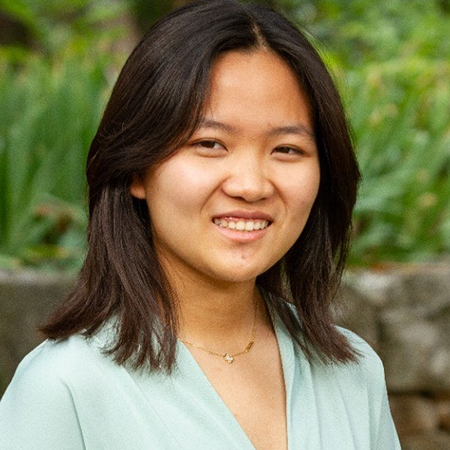
Amy Pan ’28
As Amy Pan ’28 studied and researched at her STEM-focused high school, she learned she loves to connect with others.
If you ask Amy Pan her favorite place, her answer as a child and now as a college student is still the same.
“When I was little, if I was asked where I wanted to go, I would say the library,” Pan says. “It’s still probably my favorite place to go.”
Pan says her local library in Bowling Green, Kentucky, is special, specifically because of her experience on the teen advisory board. Of all the activities she partook in during high school, which include the speech and debate team and starting a non-profit, her time volunteering among the stacks comes out on top.
“We would plan events. One of them was a theater club for community members,” she says. “We would do events just to get people interested in the library. I would shelve books, work with kids, basically do what a librarian did. I got so much out of it.”
Through this experience and others, Pan learned she loved to talk with people, sharing ideas and learning from each other. Now at Babson, armed with her gift of gab, Pan is ready to start her path toward an accounting and finance career.
What drew you to Babson?
I went to a STEM-immersive school, which is the opposite of what Babson is. That immersive experience and the small community was something I truly enjoyed about my high school. Babson has both of those things. I knew I wasn’t going to continue down the path of STEM, and I knew I wanted to go into business. The Babson curriculum is so unique and tailored to the student interests.
What are your career goals?
I love numbers, so I want to do something accounting- and financial-based in my future. While I was doing research in high school, I had these amazing mentors, and they let me have my own research class on campus, and I realized I love talking to and working with people and teaching. That solidified that I want to do something not only involved with other people but that lets me talk, collaborate, and take charge.
What do you hope to accomplish at Babson?
Outside of academics, I really want to be involved in internships. I want to make connections and grow socially. I’m from such a small town and community that I am excited to experience the outside perspective and diversity Babson has.
What is the proudest moment of your life so far?
Each year, the Kentucky government picks students to go to Kentucky’s capital and present research to state legislators. So, my senior year, I got picked to go there and present to them, and I was so proud of myself then, because that research was like my baby. I remember I poured blood, sweat, and tears in, and I was so proud of myself, not only because of the hard work I put into it, but because most of the projects they picked were science-based, and mine was not biology- or chemistry-based.
I was also one of the youngest people there, and just being able to talk to people who were willing to listen to me made me feel proud.
If you could tackle one global problem, what would it be?
Inequality in education, including learning opportunities and how education is not necessarily provided the same for everyone. I think about where I’m from, Kentucky. We have such smart, amazing people here. Truly some of the best people I’ve ever met come from here, but they’re just not given the same opportunities as people are from other, bigger places. I would love to find a way to provide education equally for everyone.
How will you bring part of home with you to Babson?
When I think of Kentucky, I think of Southern manners and Southern hospitality. We welcome everyone with open arms and warmth. That’s something I hope I can bring to Babson and be an open, warm person in the community.
Of Blank’s six leadership qualities, which one do you most identify with and why?
I identify most with Listen and Respond. To be a leader, you can’t really lead if you don’t know what the issue is. And, you don’t know what the issue is, you don’t listen to what other people are saying. The whole reason why I had the research class in the first place was because I overheard a girl saying, “I wish we had game design for juniors here.” And, I thought, well, that’s disappointing. Why not? Because you’re here because you’re brilliant. Why not give you a space to do that? And, I thought, why don’t I do something about that?
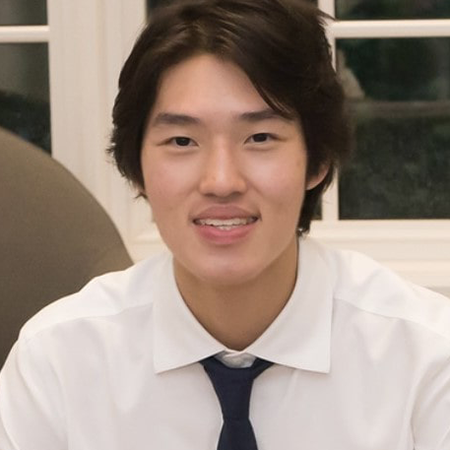
Edwin Wang ’28
Edwin Wang ’28 wants to make sure artificial intelligence is used for societal good.
Edwin Wang’s interests sit right in the center of technology and entrepreneurship. It was those two passions that led him to start two companies in high school.
“One company focuses on helping visually impaired people develop independence by helping them navigate and find objects through the iPhone,” Wang says. “I worked on integrating machine learning and artificial intelligence to the phone with audio-visual cues.”
The other company focuses on helping restaurants raise their bottom line and increasing transparency in the food-delivery industry. The app provides price transparency for customers and eliminates commission fees for the restaurant and drivers.
Wang’s ventures have him thinking about something currently on the top of a lot of people’s minds: ethical usages of artificial intelligence. It’s one of his main goals as he starts his Babson journey.
“My goal is to make sure technology and AI are being used in the right way to benefit rather than harm society,” he says.
What drew you to Babson?
Babson was the only business school I applied to. Every other university I applied to was for engineering, but what drew me to Babson is the focus Babson has on entrepreneurship. The more I thought about it, Babson provides the environment I need to thrive. Babson’s hands-on approach, drive for change, collaborative environment, and supportive professors are all necessary components for me to have an impact with technology.
What are your career goals?
My experience in robotics and programming has led me to be passionate about using technology to influence society. I hope to develop my companies into products that can be commonly used in society and the visually impaired community. My experience interviewing restaurant owners, delivery drivers, and people with low vision to improve my products has led me to understand their needs. I hope to use my experiences in technology and business to continue improving society.
What do you hope to accomplish at Babson?
I hope to continue scaling the businesses I have created and build a long-lasting community. Babson’s entrepreneurial ecosystem will provide me with the tools, resources, and networks to take my ventures to the next level. I also want to collaborate with like-minded individuals who are passionate about technology and entrepreneurship, and together, we can create solutions that address real-world problems.
How do you view challenges?
I view challenges as opportunities to improve. Every challenge presents a chance to learn, grow, and innovate. Instead of shying away from difficulties, I embrace them as they push me to think creatively and develop resilience. Challenges fuel my motivation and drive, leading to breakthroughs and success.
What is the proudest moment of your life so far?
The proudest moment in my life happened when I saw Myra, a visually impaired person, use my app for the first time. I wouldn’t say it made me proud; rather, I was motivated by the impact I could potentially have on others. It’s led me to continue with science fairs and prototypes and eventually share the impact technology can have on others.
If you could tackle one global problem, what would it be?
I want to tackle the lack of transparency within the food delivery industry. I love using food delivery apps, but they harm everyone involved by high prices for consumers, a lack of fair wages for delivery drivers, and lower profit margins for restaurant owners. In the past three years, I’ve been developing MyBite, an ethical and social food delivery app.
What does being a Blank Scholar mean to you?
Being a Blank Scholar means having confidence in my ability to be an entrepreneur. It also means being part of a community of driven individuals who are passionate about making a difference through entrepreneurship. As a Blank Scholar, I will have the opportunity to learn from and collaborate with like-minded peers, receive mentorship from experienced entrepreneurs, and gain access to resources that will help me take my ventures to new heights. It signifies a commitment to innovation, leadership, and making a positive impact on the world.
Of Blank’s six leadership qualities, which one do you most identify with and why?
I most identify with the leadership quality Innovate Continuously. For me, innovation is at the core of everything I do. Whatever I’m doing, I am constantly seeking ways to improve and create solutions that address real-world problems. Innovation isn’t just about creating something new; it’s about continuously refining, adapting, and finding better ways to meet the needs of those around us. This mindset drives me to push boundaries, embrace challenges, and never settle for the status quo. By focusing on continuous innovation, I strive to make a lasting impact and contribute to meaningful change.